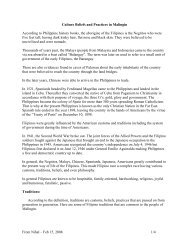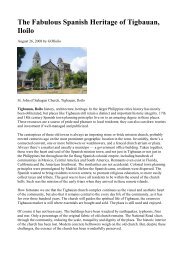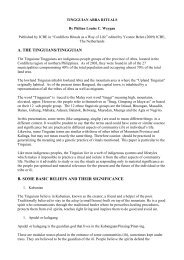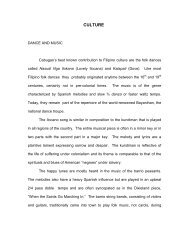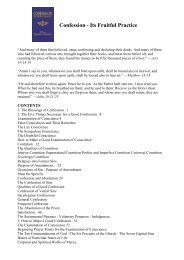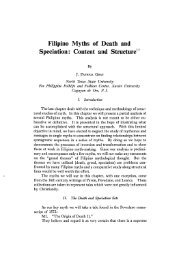What are the Differences Between Religious Orders?
What are the Differences Between Religious Orders?
What are the Differences Between Religious Orders?
- No tags were found...
Create successful ePaper yourself
Turn your PDF publications into a flip-book with our unique Google optimized e-Paper software.
Author's note: Like many of <strong>the</strong> major religious orders, <strong>the</strong> Franciscans and Dominicans have suffered greatlyin recent times. It is not uncommon today to see friars watching television, or going to <strong>the</strong> movies and eatingice cream on a Friday night. The spirit of victimhood, a hallmark of religious life, has largely been obscuredover years, as <strong>the</strong> pendulum has swung in <strong>the</strong> opposite direction to a kind of secularized love, absenst of anyausterities. However, like <strong>the</strong> Benedictines, <strong>the</strong> communities of lax traditions tend to be dying away, as newyoung communities take <strong>the</strong>ir place, devoted to a more au<strong>the</strong>ntic renewal that Vatican II called for.• DOMINICANS: The Dominican Order (or "Order ofPreachers") was founded by Saint Dominic in <strong>the</strong> early13th century, who saw <strong>the</strong> need for greater education andengagement of society. As <strong>the</strong> name implies, <strong>the</strong> charismof <strong>the</strong> Dominicans is primarily preaching and teaching "tocombat heresy and propagate religious truth". SaintDominic possessed a great love for Our Lady, and isconsidered <strong>the</strong> founder of <strong>the</strong> Holy Rosary. He was alsorenown for his <strong>the</strong>ological disputations against heretics,particularly <strong>the</strong> Albigensians, to which he won many to <strong>the</strong>faith. In fact, his preaching was so effective, that <strong>the</strong>enemies of <strong>the</strong> Church soon resorted to insults andthreats, seeing that <strong>the</strong>y were unable to refute hisarguments. During this time <strong>the</strong> Inquisition was alsoestablished, for which <strong>the</strong> popes appointed mostlyDominicans as Inquisitors due to <strong>the</strong>ir superior <strong>the</strong>ologicaltraining and impeccable virtue. It is thus that <strong>the</strong> spirit ofSaint Dominic takes on a proactive scholastic--and almostapologetic--character; not for <strong>the</strong> sake of knowledge initself, but ra<strong>the</strong>r, for <strong>the</strong> defense of <strong>the</strong> Church in <strong>the</strong>modern world and <strong>the</strong> building up of <strong>the</strong> body of Christ.Saint Dominic teaches us <strong>the</strong> power that words can haveon people, especially when <strong>the</strong>y <strong>are</strong> supported by prayer and sacrifice. Although he practiced manyaustere penances to <strong>the</strong> bewilderment of his followers, he also loved heretics deeply and sought tounderstand <strong>the</strong>ir positions in order to effectively combat <strong>the</strong>m. As <strong>the</strong> Catholic Encyclopedia tells us;"If he abominated heresy and laboured untiringly for its extirpation, it was because he loved truth andloved <strong>the</strong> souls of those among whom he laboured. He never failed to distinguish between sin and <strong>the</strong>sinner. It is not to be wondered at, <strong>the</strong>refore, if this athlete of Christ, who had conquered himselfbefore attempting <strong>the</strong> reformation of o<strong>the</strong>rs, was more than once chosen to show forth <strong>the</strong> power ofGod." Today, unfortunately, much of <strong>the</strong> apostolic spirit of Saint Dominic has largely been obscuredwithin <strong>the</strong> order, as <strong>the</strong> Dominicans <strong>are</strong> no longer distinguished as zealous defenders and promotersof <strong>the</strong> Church (indeed suffering <strong>the</strong> same lot of most religious communities of our time). However,<strong>the</strong>re <strong>are</strong> still signs of hope within <strong>the</strong> order, especially among <strong>the</strong> female branch, who have devoted<strong>the</strong>mselves to <strong>the</strong> education and catechetical formation of <strong>the</strong> young. It is not uncommon to find suchDominicans within <strong>the</strong> context of <strong>the</strong> school system as teachers and professors, or even fur<strong>the</strong>ring<strong>the</strong>ir own higher education toward this end. It is worthy to note that <strong>the</strong>se communities have beenespecially flourishing with many new vocations, often more than <strong>the</strong> walls of <strong>the</strong> enclosure cancontain. While most Dominicans <strong>are</strong> active, some some communities may also live a strictly cloisteredlife.• JESUITS: The Jesuits (or <strong>the</strong> Society of Jesus) was founded by Saint Ignatius of Loyola in 1540 A.D.The original name of <strong>the</strong> Jesuits was <strong>the</strong> "Company of Jesus", to denote <strong>the</strong> soldier-like spirit of <strong>the</strong>order. Due to its rigorous and orthodox formation system, it had quickly grown in reputation by <strong>the</strong>holiness and well-grounded faith of its fa<strong>the</strong>rs. In fact, <strong>the</strong> Jesuits merited such high repute, that <strong>the</strong>irpriests became <strong>the</strong> most revered and respected of all priests, and were regarded by <strong>the</strong> saints asmasters of spiritual direction. Saint Teresa of Avila even once said that she would not even consider awoman entrance into <strong>the</strong> Carmelites unless she had been directed by a Jesuit priest. And later, shestated; "They <strong>are</strong> my fa<strong>the</strong>rs, and it is to <strong>the</strong>m, after Our Lord, that my soul owes all <strong>the</strong> good itpossesses." Many saints in fact have been formed under <strong>the</strong> spiritual direction of Jesuit priests. TheJesuits used to also take a fourth vow of fidelity and service to <strong>the</strong> pope, and were once regarded bymany as <strong>the</strong> "black popes", due to <strong>the</strong>ir prestige. The Jesuits were also known for <strong>the</strong>ir missionarywork, spreading <strong>the</strong> faith to many countries almost single-handedly And yet, despite its radiant historyof such lavish fruit, this magnificent order has fallen fur<strong>the</strong>r than all <strong>the</strong> o<strong>the</strong>rs, to where it is now but afaded glimmer of its former splendor. (For those seeking to better understand <strong>the</strong> foundational spirit of<strong>the</strong> Jesuits, we suggest reading books authored by Jesuits prior to ~1920's, as books of <strong>the</strong> 1930's,40's, and 50's, increasingly became influenced by <strong>the</strong> seeds of Communism and Fruedianpsychology.)



